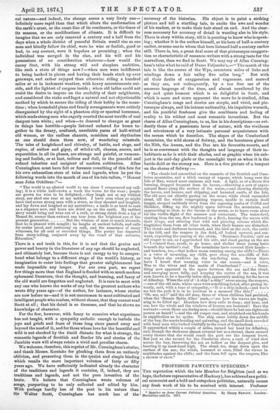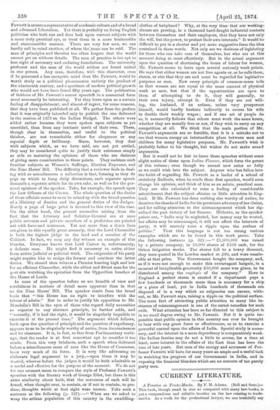PROFESSOR FAWCETT'S SPEECHES.*
THE reputation which the late Member for Brighton (and as we hope, the future representative of Hackney), has achieved as a politi- cal economist and a bold and outspoken politician, naturally causes any fresh work of his to be received with interest. Professor * Speeches on Some Current Political Questions. By Henry Fawcett. London : Macmillan and Co. 1873.
Fawcett is at °noes representative of academic culture and of a broad and advanced Liberalism. Yet there is probably no living English politician who both can and does look upon current subjects with a more truly practical eye, or treat them in a more businesslike and statesmanlike manner. There are very few men, we can hardly call to mind another, of whom the:saine can be said. The man of principles and theories too often forgets that the world cannot get on without details. The man of practice is too apt to lose sight of necessary and enduring foundations. The university professor and the man of the world seldom are found united in one person. Any man, therefore, with this character, even if he possessed a less energetic mind than Mr. Fawcett, would be worth study as a political phenomenon entirely the product of the nineteenth century, and a specimen of modern political growth who would not have been found fifty years ago. The publication of thirteen of Mr. Fawcett's recent speeches in a connected form must necessarily be interesting. Yet they leave upon us a certain feeling of disappointment, and almost of regret, for some reasons, that they have been published at all. We gather from the preface that it was originally intended only to publish the one delivered in the session of 1873 on the Indian Budget. The others were added rather because they were spoken upon subjects as yet unsettled, than from any intrinsic merit of their own. These, though clear in themselves, and useful to the political thinker, are not remarkable either for eloquence or any especial depth or brilliancy. Since, however, they deal with subjects which, as we have said, are not yet settled, they may be considered quite to justify their existence simply as aids to maturing the opinions of those who are desirous of giving more consideration to these points. They embrace such familiar subjects as Women's Suffrage, Election Expenses, and the Nine Hours' Bill. The difficulty that a reviewer feels in deal- ing with so miscellaneous a collection is that, forming as they do pegs on which to hang daily discussions, each separate speech demands a separate article for its own sake, as well as for the per- sonal opinions of the speaker. Take, for example, the speech upon the Law Officers of the Crown. The whole question of the duties of these officials seems to us to be mixed up with the broad question of a Ministry of Justice and the general duties of the Judges. Barely a page of large print is devoted to this view of the case. On the other hand, the present anomalies arising from the fact that the Attorney and Solicitor-General are at once public servants and private members of a profession are pointed out with force and acuteness. Yet not more than a dozen lines are given to this equally great anomaly, that the Lord Chancellor is both the highest judge in the laud and a member of the Cabinet. In fact, we may any day witness an example of this blunder. Everyone knows that Lord Cairns is, unfortunately, a delicate man. He might find it necessary to retire either from active judicial or political work. The exigencies of his party might require him to resign the former and continue the latter duties. We should then witness a Premier hunting high and low for an efficient Chancellor, while the ablest and fittest man for the post sits watching the operation from the Opposition benches of the House of Lords.
In none of the speeches before us are breadth of view and carefulness in matters of detail more apparent than in that on the Nine Hours' Bill. The speaker starts from the broad basis that " this House has no right to interfere with the labour of adults." But in order to justify his opposition to Mr. Mundella's Bill in the eyes of those who regard daily necessities as. superior to any abstract principle, he further adds, and "secondly, if it had the right, it would be singularly impolitic to exercise it at the present time." The argument which follows, both upon the question of principle and the question of expediency, appears to us to be singularly worthy of notice, from its conciseness and its clearness. It is, in fact, so free from Parliamentary verbi- age, that the reader is at first somewhat apt to consider it too crude. From this very briefness, such a speech when delivered before a miscellaneous mass of men like the House of Commons, loses very much of its force. It is very like addressing an elaborate legal argument to a jury,—upon them it may be wasted, whereas before the judges it would be both admirable as a model and effective for the purpose of the moment. We do not for one moment mean to compare the style of Professor Fawcett's speeches with the literary work of George Eliot, but there is this same similarity about both, 0114 the sentences of each will be found, when thought over, to contain, or if not to contain, to pro- duce, thoughts which at first sight were unseen. Take such a sentence as the following (p. 127) :—" When are we asked to wrap the artisan population of this country in the swaddling-
clothes of babyhood? Why, at the very time that our working classes are proving, in a thousand hard-fought industrial contests between themselves and their employers, that they have not only the will, but the power, to protect their own interests." It would be difficult to put in a shorter and yet more suggestive form the idea contained in these words. Not only are we desirous of legislating for those who can take care of themselves, but who are at this moment doing so most effectively. But in the actual argument upon the question of shortening the hours of labour for women, Mr. Fawcett seems to leave open several seriously weak points. He says that either women are not free agents or, as he calls them, slaves, or else that they are and must be regarded for legislative purposes as men. Now every principle of common-sense tells us that women are not equal to the same amount of physical work as men, but that if the opportunities are open to them of attempting to do it, they will generally, to their own injury, attempt it. Even if they are not will- ing, the husband, if an artisan, unless very prosperous himself, would hardly hesitate indirectly to coerce his wife to double their weekly wages ; and if one set of people do so, it necessarily follows that others must work the same hours, whether they are morally free or not, if they wish to carry on any competition at all. We think that the main portion of Mr. Fawcett's arguments are so forcible, that it is a mistake not to see that women occupy an intermediate place between men and children for many legislative purposes. Mr. Fawcett's wish is probably father to his thought, but wishes do not make sound arguments. .
But it would not be fair to leave these speeches without some slight notice of those upon Indian Finance, which form the germs of this volume ; even though we cannot now enter as fully as we could wish into the subject. Anyone who has fallen into the habit of regarding Mr. Fawcett as a leader of a school of crotchety Radicals, when he reads these first speeches, would soon change his opinion, and think of him as an astute, practical man. They are also calculated to raise a feeling of considerable astonishment that the subject obtains so little attention in Eng- land. If Mr. Fawcett has done nothing else worthy of notice, he deserves the thanks of India for his persistent advocacy of her claims, and for calling attention to the mismanagement which has sig- nalised the past history of her finance. Hitherto, as the speaker points out, " India may be neglected, her money may be wasted, her affairs may be mismanaged, it will not affect the interests of party, it will scarcely raise a ripple upon the surface of politics." That this language is not too strong various examples which are to be found in this work prove. Take the following instance (p. 32) :— " £1,000,000 was raised by a private company, in 10,000 shares of £100 each, for the Orissa irrigation works. The shares fell to a heavy discount, they were quoted in the London market at X60, and were unsale- able at that price. The Government bought the company, and, as if it were not enough to make this extravagant bargain, in a moment of inexplicable generosity £50,000 more was given, to be distributed among the enzployls of the company." Here in England a perfect storm is created if a department pays a few hundreds or thousands more than is necessary for a ship or a piece of land, yet in India hundreds of thousands are disposed of in a way which no exigencies can excuse, with- out, as Mr. Fawcett says, raising a ripple on the political surface. The mere fact of attracting public attention to many like in- stances of mismanagement is one of the surest remedies for such evils. What attention has been so far directed to this subject Is in no small degree owing to Mr. Fawcett. But it is quite im- possible that public opinion in this country can ever be brought to bear with any great force or effectiveness, so as to exercise a powerful control upon the affairs of India. Special study is neces- sary, and the interest in a mere dependency is comparatively weak. The Indian famine may do not a little to arouse, for a time at least, more interest in the affairs of the East than has been the case of late years. But men of the energy and acuteness of Pro- fessor Fawcett will have for many years an ample and a useful task in watching the progress of our Government in India, and in exposing the financial blunders which are no concern of too purely party men.



































 Previous page
Previous page